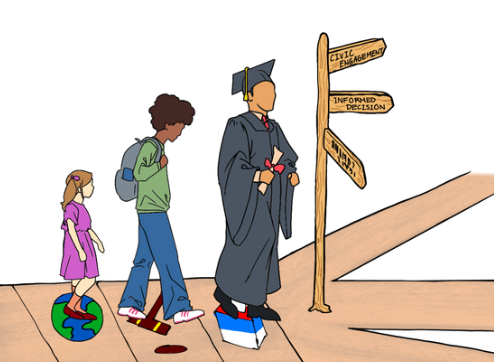Written by Katie Russell
Published in the October 8, 2015 issue
Religion is a sensitive subject for many reasons; the establishment of separation of church and state requires that the public education system not support or promote any religion. At the same time, it is necessary for Gunn to respect the religious practices of any of its students. Many religions have holidays which include extensive traditions or ceremonies. These often require students who observe that religion to miss school. Some students have undergone an unnecessary amount of stress and worry due to having to miss school for their religion, and it is important for the administration and the community to recognize this flaw in the system. However, adding more school holidays is an ineffective and impractical solution. Religions and their practices should be honored, but it is not wise or even feasible to take an increased number of days off of school for religious purposes.
A major issue with the idea of creating additional religious holidays would be the process taken to decide which holidays should be added. Where do we draw the line? The three largest world religions, Christianity, Islam and Judaism, celebrate a total of 34 major holidays per year. Obviously, it is impossible for us to take every holiday off for every religion observed by Gunn students—and no one is asking for this.
This in turn creates another issue. If the administration were to add more school holidays, they would have to pick and choose which ones. It is simply not the school’s place to determine whether or not a religion “deserves” to be taken off school for all students. No religion is objectively better or more important than another, and it is impossible for the administration to draw a line between what holiday is worth a day off school. If even one student at Gunn observes a certain religious holiday, they have an equal right to their religious practices, and it is unfair to favor one religion over another just because one may have more followers at Gunn.
Creating more school holidays is not the correct way to alleviate stress caused by missing school for religion. This stress is a product of ineffective absence policies and a perceived lack of cooperation on the part of teachers. Teachers and students should work with Gunn attendance and administration to form a more thorough protocol for absences due to religious reasons, in which no student is penalized for their religious beliefs.
As it stands, an absence from school for a religious holiday is considered excused. According to the California Education Code, a student with an excused absence is entitled to the opportunity to make up any work that he or she missed. Inconsistencies and anomalies in policies are detrimental and unfair to students. One such inconsistency is that though teachers are prohibited from grading on attendance alone, in some courses participation grades are linked to attendance. Progress has been made in the area of consistency by the English department, which instituted a late-work policy across the department, and hopefully progress will continue to be made as more departments adopt policies of their own.
With a consistent absence policy recognized and observed across all departments as well as cooperation from both teachers and administration, students should be able to make up any work that they have missed without worry- ing that their religious beliefs or decisions have affected them adversely in terms of their performance in school.









